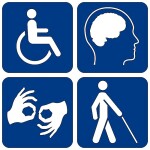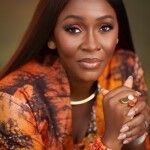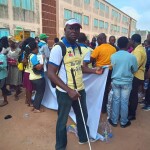Two things stick out among the lots of issues rocking the Nigerian disability community as a population segment. One, random surveys of disability NGOs operating in the red ocean of advocacy in Nigeria will yield 12. Max. That’s in addition to a warren of homes, foundations, and centres posing to serve a population standing 35 million strong. Few players so muddying up the waters poses a puzzle. Number 2 is the use—and abuse—of perking order of power which status hands the NGO owners. Many of them are now cooing fat cats who got the cheese. Decades ago, they were squawking ugly ducklings grubbing around while trying to find their voices.
That speaks of the power of money—funders’ dollars, euros, and pounds trickling in for projects the NGOs propose as advocating rights, diversity, equality, and inclusion in Nigeria. More than 25 foreign do-gooders, including the McArthur Foundation, the Bill and Melinda Gates Foundation, the Ford Foundation, and others, support such cause in Nigeria. Likewise some disability-specific funders like the Abilis Foundation, the Air France Foundation, the Christian Blind Mission, the Disability Rights Fund (DRF), and others. No fewer than 21 OPDs, including JONAPWD ($200,000), TAF ($60,000), CCD ($30,000), NAB ($25,000), DWAI ($40,000), IFA ($26,000), SIAN ($21.000) and others got $722, 000 in total from the DRF in 2024 alone.
Add to these pools of funds tranches coming from other international aid agencies like USAID, UKAID, and others. Before it shut down, USAID alone donated more than $800 million in humanitarian funding to Nigeria’s agencies and NGOs in 2024, according to the US Foreign Assistance Dashboard. The slice of this fund that fell to the disability advocates is difficult to trace. But, no matter how they diced it, some would still drop in the lap of the disability advocates.
However, in Nigeria, what bedevils governmental organizations equally plagues the NGO sector: what you see is not exactly what you get. This opacity is even more of a privilege for the latter. The law establishing them provides for tax exemption. It then becomes pretty hard for a PWD to trace what accrues to a particular not-for-profit organization of persons with disabilities, except when funders like the DRF declare such. The unelected movers and shakers the NGO owners have become wield another advantage: they can make a loud enough noise to drown out government calls for scrutiny of the sector; accountability then comes to near zero. Except to their funders only.
So the Nigerian disability advocates owe the community no accountability—in transparency, leadership, and project execution. The recklessness that spins off from this manifests in many ways. There is this old boy’s network of disability NGO workers. Brothers, sisters, and friends are jobbed in or planted in a scratch-my-back-and-scratch-your-back fashion across the NGOs. The sweetheart recruitment model results in conflict of interests—and even entrenched interests. In that wise, competition among disability NGOs becomes bloodier. They churn out projects for no enduring reason other than to notch up figures—and “firsts-in- history” media puffery.
This trend has continued over the years. And some PWD owners of NGOs have ridden on it to become men and women of substance. According to Nexford University, a CEO of an NGO in Nigeria earns about N20 million monthly, despite the organization turning no profit. Pieces of estate in the choicest parts of Lagos, Abuja, and other major cities traced to these NGO owners, including those advocating disability, confirm many of them live in the lap of luxury. The opulence often pushes through the façade of the underdog they project. With their new status in the community comes power—to oppress the lesser PWDs, deal out favors to those who kiss up to them, and muzzle opposition with violence and legal threats.
No point emphasizing how the acquired status rubbishes some of these powerful founders’ advocacies for diversity, equality, and inclusion. The community’s elite, however, ignores this social caste system. But they waste no time baying for blood when disability rights violation happens elsewhere. It no doubt occurs to the community’s upper crust as double standard. Somehow, they have their hands tied.
For equality’s sake, this trend must stop.
The media and financial watchdogs barking and frisking the rotten and the corrupt in the governmental sector might not have done much. But the situation could have been worse without their efforts. Since ‘all animals are equal”, the players in the disability NGO sector deserve no such insularity as they enjoy now. They need the muck-raking journalism that will follow the donors’ money; they also need the kind of sleuthing that will follow the scent of the rot in the not-for-profit industry.
It’s by so doing the true sense of diversity, equality, and inclusion can take hold in the disability community which advocates it, and even needs it the most. After all, a part should not be greater than—or more different from—the whole.






